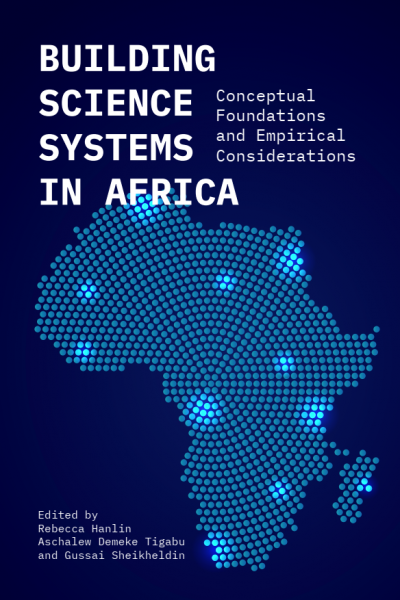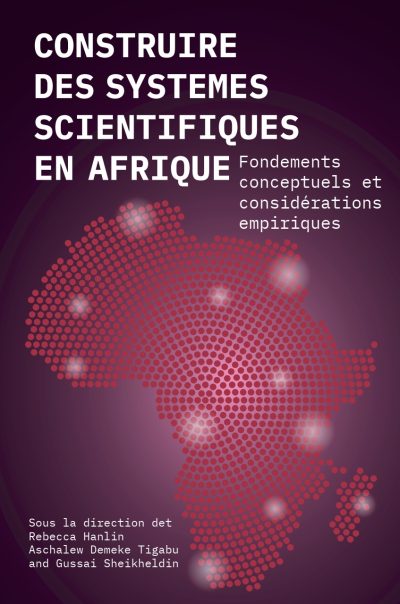Edited by:
Rebecca Hanlin, Aschalew Tigabu, Gussai Sheikheldin.
Publishers: Nairobi: African Centre for Technology Studies (ACTS) Press; Dar es Salaam: Mkuki na Nyota Publishers @2021
ISBN 978-9966-08-198-3
Building Science Systems in Africa: Conceptual foundations and empirical considerations.
In recent years a significant amount of attention has been placed on the role of science, technology and innovation for Africa’s social and economic transformation. This book builds on the efforts made in this area and argues that more needs to be done to strengthen African Science Systems. We use the term ‘Science’ and ‘Science Systems’ recognising that what is important is not just the study and accumulation of knowledge but also its application and use. This book brings together the findings of research conducted by academics, practitioners and policy makers during the first phase of the Science Granting Councils Initiative. It argues that building stronger and more broadly defined science systems requires recognition and critical study of relevant concepts and theories. It also focuses on key areas that require empirical study and analysis. This book focuses specifically on the key role of what are known as ‘Science Councils’ in Africa as providing a mediating role between the actors, organisations and institutions involved in African Science Systems. It also argues that – in order for Science Councils to be more effective- there is a need for more ‘science on science’ or the study of how science systems function and how they can be strengthened to assist African countries reach their social and economic development goals.
“Building science [Science, Technology and Innovation] systems is perhaps the most formidable challenge facing African countries for several reasons. The science gap between Africa and the advanced regions of the world is huge and it is widening by the day. Unfortunately, it does not appear as if the prevailing policy recognition of the role of science in development is taken too seriously in Africa. Yet, there is a glimmer of hope in the institutions set up for the building and rejuvenation of STI systems. This book explores the hope that is there for STI systems in the science granting councils in Africa. Importantly, the book discusses and analyses the experiences and lessons from these councils in some African countries and points the way to enhancing the building of science systems on the continent. In an age when sustainable development has become a dominant paradigm, understanding the role of science granting councils in development is almost an urgency for African countries.”
– Prof. George Owusu Essegbey Chief Research Scientist, Science and Technology Policy Research Institute (STEPRI), Council for Scientific and Industrial Research (CSIR), Accra, Ghana
French version:
Construire Des Systemes Scientifiques En Afrique: Fondements conceptuels et consid rations empiriques
Ces dernières années, une attention considérable a été accordée au rôle de la science, de la technologie et de l’innovation dans la transformation sociale et économique de l’Afrique. Cet ouvrage s’appuie sur les efforts déployés dans ce domaine et affirme qu’il est nécessaire de multiplier les efforts pour renforcer les systèmes scientifiques africains. Nous utilisons les termes “science” et “systèmes scientifiques” en reconnaissant que l’important n’est pas seulement l’étude et l’accumulation des connaissances, mais aussi leur application et leur utilisation. Cet ouvrage rassemble les résultats des recherches menées par des universitaires, des professionnels et des décideurs au cours de la première phase de l’Initiative des conseils subventionnaires de la recherche scientifique. Il soutient que la construction de systèmes scientifiques plus forts et plus largement définis nécessite la reconnaissance et l’étude critique des concepts et théories pertinents. Il se concentre également sur les domaines clés qui néces- sitent une étude et une analyse empiriques. Ce livre se concentre spécifiquement sur le rôle clé de ce que l’on appelle les “Conseils de la recherche scientifique” en Afrique, qui jouent un rôle de médiateur entre les acteurs, les organisations et les institutions impliqués dans les systèmes scientifiques africains. Il fait également valoir que, pour que les Conseils de la recherche scien-tifique soient plus efficaces, il faut davantage de “science sur la science” ou l’étude du fonctionnement des systèmes scientifiques et de la façon dont ils peuvent être renforcés pour aider les pays africains à atteindre leurs objectifs de développement sociaux et économiques.


